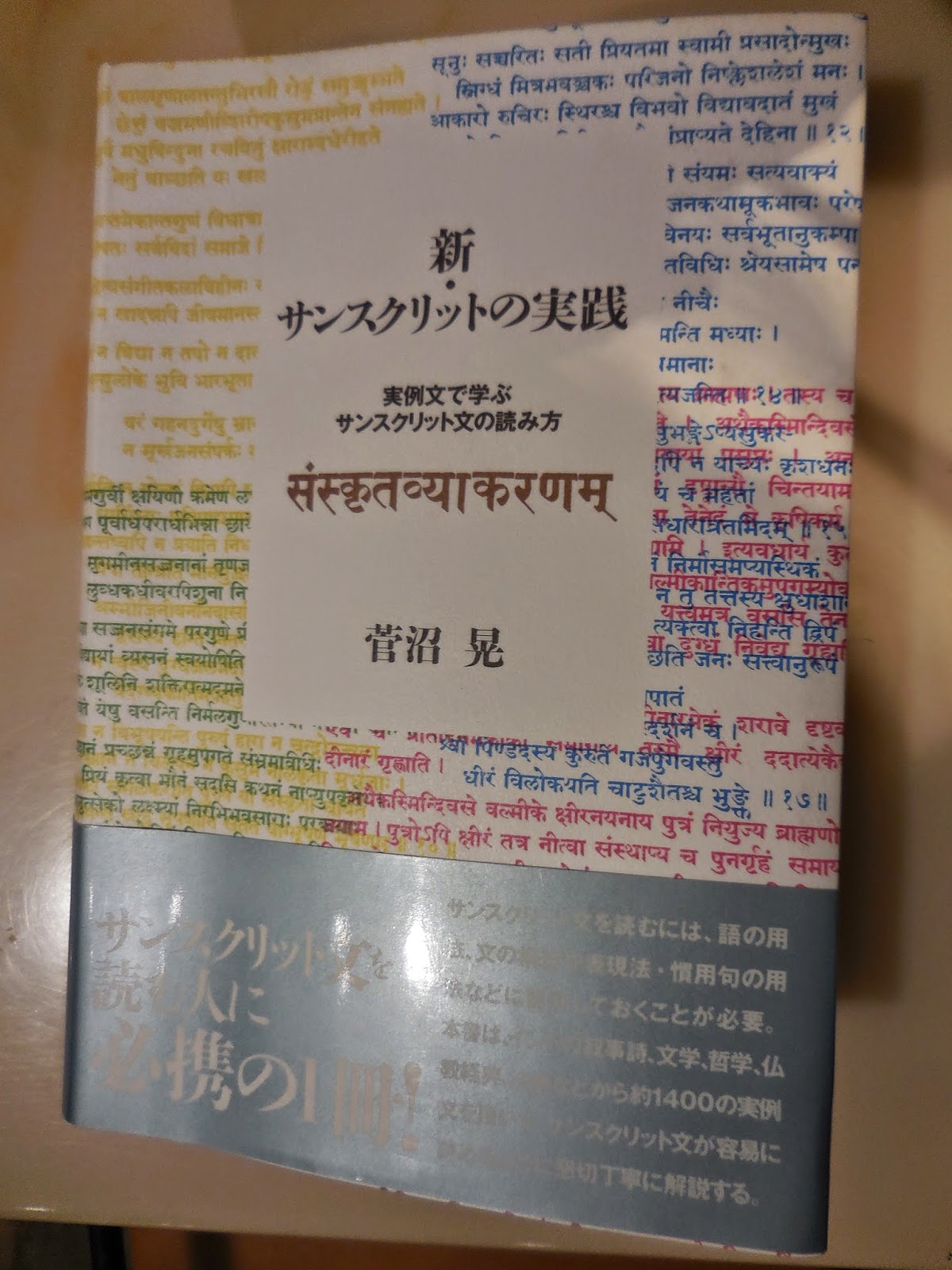Suganuma sensei is my Sanskrit teacher at Asahi Culture Center at Shinjuku, Tokyo. I joined his advanced class since April without knowing devanagari. I only took one basic Sanskrit course from one of his students long time ago.
The class has been working on Bhasa's play. It's been very interesting.
This is my third Sanskrit book written by him. He told me he didn't like to sign his books. I said, "Why not?" He eventually signed it for me. I would regret it if he didn't so I'm glad about that.
I didn't know he also wrote my name. Thank you!
The bookstores in Japan offer book-cover services. They usually ask customers if we want it, but this time the worker didn't ask me. She handed me the book as you see it as above photo.
I have a lot to say about this first page already but I need to rest my eyes. It's very exciting to talk about each word and on my each discovery!
I like this book. It's thick but not heavy and the corners are round.
I was unaware that he was the author of my first two Sanskrit textbooks when I joined his class in April.






13 comments:
I see "isvara" on that page and thought about my past blog on vara and svara.
http://redroom.com/member/keiko-amano/blog/vara-dundubhi-svara
Sayam is evening. I wonder the last two alphabet am (morning) is negated by the previous "a".
Asa means morning in Japanese.
I wonder if it came from "sa" of sayam and the previous "a" to negate it.
The previous blog prior to above is this.
http://redroom.com/member/keiko-amano/blog/sad-dharma-pundarika-sutra
It's always special to have a book signed by the author! I like the idea of the book shop cover. I wish they did that here in Canada.
Kristie,
Would you like to cover your book to protect from soiling or people looking at what you're reading?
I like people's taking care of things but I wish Japanese are less shameful.
In the Bhasa's play we studied yesterday, the word "apandito" appeared. It means fool. So I recognized pundit came directly from Sanskrit. I told the teacher I see the word being used in American political news. "a" is to negate the word that followed. I wonder if Spanish still use it the way it is, apandito. It's fascinating to see all the elements of many languages in Sanskrit. I wonder if I'm the only Japanese to see the similarity between Sanskrit and Japanese, and I'm not talking only about those words routed from Classical Chinese sutras. Probably what I see is part of the monster study, 妖怪学。Inoue Enryo said something like it's our minds that want to see the monster therefore we see them. If mine is a monster, it's beautiful.
Also you see "namati" in the above photo of Sanskrit text. I think it means to pray. Namae in Japanese is name.
Name, noun, and pray to greet the person when we meet, they all come to me as one source. How precious that is. In spirit, we are all connected, that's how I feel about it.
How exciting and how attractive it all is.
Thank you, ZACL, for adding your comment. I think I should take better photos of him. This one, he looks stiff because I wasn't tactful in taking his natural poses. I'll take more photos and update this post.
Very interesting post! I like finding words that are similar to my language in Sanskrit and sometimes I find words in Sanskrit that are similar to other languages I know.
This is not related but I really like how Japanese "o-cha" is similar to "chay" in Hindi and Russian and even "tea" in English. Also, Japanese for "scold" is "shikaru" and "shikaar" in Hindi means "victim"...(And yes this hasn't been related to Sanskrit).
CrazyLassi,
I get excited when I read similar sounding words in other language. "Japanese for "scold" is "shikaru" and "shikaar" in Hindi means" It's very interesting to me. My grandfather and mother had darker skin which I imagine I have some blood inherited from South, also! About tea, chai, chay, I named my first book, "Ocha Teacher" because it means Ocha-cha, Tea-cha, cher-sounds like cha! So, cha cha cha! Please see my FB author page with the same profile picture. Thank you, for your comment.
Post a Comment